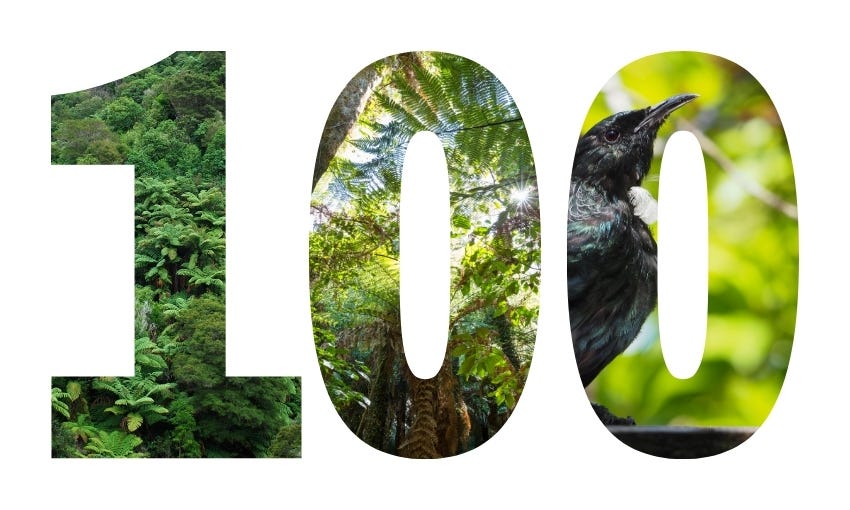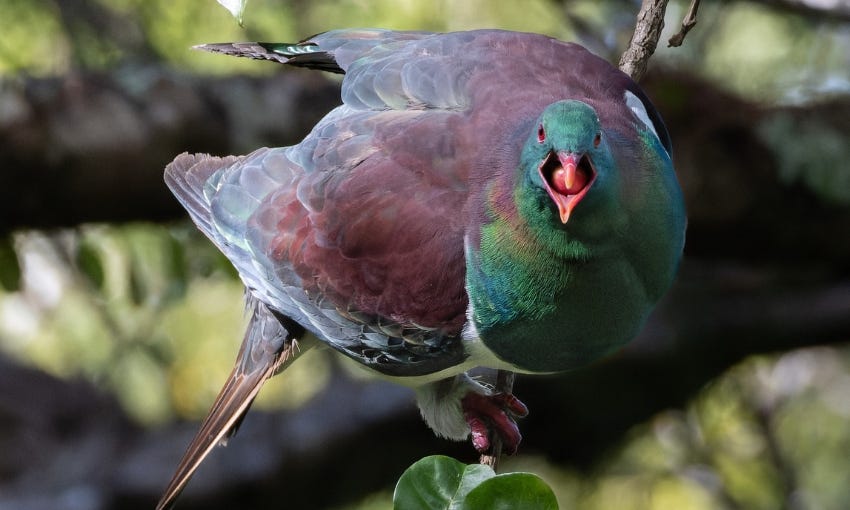Kia ora! Thanks for joining me this week, for the 100th edition of Future Proof.
I can’t quite believe this is the 100th little newsletter I’ve written. Almost every week for two years, this slice of hopeful-but-honest environmental commentary has winged its way into inboxes across Aotearoa (and beyond).
We’ve covered all sorts of stories, from wild world maps to misunderstood seagulls. Now feels like a fitting moment to look back on some of my faves, and some recurring themes.
What we’re eating
Food is something we all share. It’s also a big piece of the climate puzzle: from what we eat, to how we grow it, and how we discard our scraps. Adopting a plant-rich diet and tackling food waste are the two most impactful climate actions individuals and households can take, according to Project Drawdown. In Future Proof, food is often at the forefront: we’ve covered what a “planetary health” diet looks like in New Zealand, and highlighted innovative ways we can reduce food wastage – from eating ugly produce, to rescuing food from eateries with an app, to programmes dedicated to redirecting unwanted food to those in need.
Our cities, and how we get around
More than 80% of New Zealanders live in urban areas – including me, as of a month or so ago. One of the things I’m most excited about for city life is getting around by bike, so I don’t have to sit stuck in traffic or faff about trying to find a carpark. We’ve talked about the climate (and other) benefits of cycling here, and why cycle lanes aren’t actually bad for business. Plus we’ve delved into heaps of other city-related solutions, from footy fields that double up as flood basins to how volunteering can create resilient communities and even designing eco-friendly buildings inspired by nature.
Capturing carbon
One of the joys of story-hunting for Future Proof is discovering all the creative and diverse solutions that exist in the climate and environment space – from drones for tracking penguins, to plastic-free drinks. One idea that has stuck with me since writing about it a year and a half ago is making biochar – a charcoal-esque residue that can lock up carbon for hundreds of years. It’s a potential solution for dealing with forestry slash and can enrich soils for growing food.
So many good, kind, clever people
Around this time last year, I wrote a bit about my process for deciding what to cover in Future Proof, and my approach to hope in the face of a climate crisis. It’s easy to fall into doom and gloom when you’re immersed in the environment space, but it’s by taking action – no matter how small – that we can nurture a tiny, precious seed of hope.
Looking back over the Future Proof archive of 100 stories, I see so much of that action-based hope. I’m struck that there’s no shortage of good, kind, clever people doing good things. We’re restoring kelp forests and bringing biodiversity back to our backyards. We’re changing the way we farm and recycling textiles. We’re cleaning up beaches and composting.
And you’re reading all about it. I’m very grateful to you all for being here – whether you’re an OG subscriber or new, it’s so heartening to know that there’s a community of people interested in nature and climate action. Thank you.
Show your support, join up today!
"Thank you to The Spinoff team for a balanced news, arts, culture, society site, for the (mostly) clear sighted writing and, especially, for the intelligent satire. There needs to be space to be able to laugh" - From a Spinoff member.
If you've appreciated our political satire, as well as our journalism, please consider becoming a member today.
‘The only animal that takes ourself out of the ecosystem when we die’
For Death Week on The Spinoff, Claire Mabey visits the Mākara natural burial cemetery, which offers a more environmentally friendly option than traditional burial or cremation. With a tree planted on every shallow grave, the cemetery will eventually become a woodland. Claire finds out the story of the natural burial movement in New Zealand, and lays out the principles and pragmatics of what a natural burial entails. In another Death Week piece, Alex Casey reports on water cremation – a more environmentally friendly option compared to flame cremation – and the people working to bring the technology to New Zealand.
Climate progress gets ‘yellow card’
New Zealand faces an “urgent need” to strengthen its climate policies, or else risk blasting through our emissions budgets and missing targets, according to the first-ever monitoring report from the independent Climate Commission. The commission highlighted agriculture and transport as areas of concern, with significant risks for delivering emissions reductions in these sectors based on current government policy. Both RNZ’s Eloise Gibson and Newsroom’s Marc Daalder have covered the monitoring report.
More excellent recent climate reportage from Gibson and Daalder: climate minister Simon Watts has been warned that delaying deals to secure offsets for 100 million tonnes of carbon emissions could see a fivefold cost blowout. And the government has missed its own deadline for speeding up renewable energy development.
Agricultural emissions reduction efforts called out
Fonterra is among global dairy and meat giants called out in an international report for spending more on advertising than on research and development. The report also features a case study on the “delay and distract” tactics used by New Zealand’s agricultural industry to avoid being accountable for their planet-heating emissions. Meanwhile, the government has claimed it is taking a “technology-led” approach to agricultural emissions reductions, but has come under fire for cutting funding for the research programme aimed at tackling exactly those emissions.
More stories
We’re only at the dawn of AI, and yet it’s already fuelling massive emissions growth and straining electricity grids, Shanti Mathias reports for The Spinoff.
Funding support for New Zealand’s grassroots community conservation groups is drying up, meaning hard-won gains for threatened species are at risk of unravelling, according to a report commissioned by the Predator Free New Zealand Trust.
How are Kiwi businesses faring in the quest to reduce plastic packaging? The Sunday Star Times’ Aimee Shaw finds out (paywall).
Seals wearing satellite-tag hats are helping scientists track changing ocean currents and conditions.
Offshore wind companies are worried that seeking fast-track approval for consents could jeopardise their social licence, Newsroom’s Fox Meyer reports.
“Map and zap”: drones equipped with lasers could be the future of herbicide-free weed control, according to The Detail podcast.
Air New Zealand has ditched its 2030 climate target.
Image credit: Ashley Anderson via iNaturalist (CC BY-NC-SA 4.0).
To finish this edition, fruit-munching birds are just like us: they stress-eat. That’s according to an analysis of 97 bird species from around the world, and the more than 800 plants they consume. Those birds living in more stressful environments – on the edge of their geographic ranges – tended to chow down the calories by snaffling the biggest possible fruits that would still fit in their beak.
Trying to think of a snack pun that isn’t too cheesy,
Ellen
Future Proof is looking for a sponsor!
Connect your brand with an insightful exploration of environmental news, reaching influential readers committed to sustainability and staying informed about the state of our natural world. Contact commercial@thespinoff.co.nz to learn more.
Got some feedback about Future Proof or topics you’d like covered? Get in touch with me at futureproof@thespinoff.co.nz














Ngā mihi Ellen, thank you for your mahi~!! I really appreciate it. It is a sorely-needed one-stop shop filled with everything (and not just all the bad news). I know I miss heeaaaps of stuff I should be across, so I really rely on this to catch up. My read it-later list grows out of pace with what I can keep up with though, and everything feels "read it now!". Anyway, congrats on the milestone of 100 newsletters and please keep it up!!